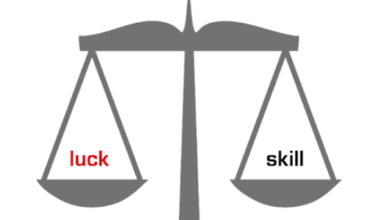What Entrepreneurs Can Learn from Professional Gamblers

At first glance, entrepreneurs and professional gamblers seem like they belong in different worlds. One builds companies, the other plays high-stakes games. But dig deeper, and you’ll see striking similarities—both require calculated risk-taking, strategic decision-making, and the ability to manage uncertainty.
The best entrepreneurs and gamblers don’t just rely on luck. They analyze opportunities, manage resources wisely, and stay mentally composed under pressure. Understanding how gamblers operate can provide entrepreneurs with valuable lessons that apply to business, investing, and even daily decision-making.
1. Risk Assessment: Knowing When to Bet Big and When to Walk Away
Every business decision involves risk. Entrepreneurs must decide when to launch a product, invest in marketing, or enter new markets. Professional gamblers face similar choices—do they go all in on a strong hand, or fold to avoid unnecessary losses?
Both rely on risk assessment techniques:
- Probability Analysis – Successful gamblers calculate odds before making a move, just like business owners analyze market trends before expanding.
- Calculated Risks – Entrepreneurs and gamblers both take chances, but never blindly. They gather data, weigh options, and make informed decisions.
- Exit Strategies – Smart gamblers know when to walk away from a bad game, just like entrepreneurs recognize when a business venture isn’t working.
A great example of this in business is Jeff Bezos. When Amazon started, he knew e-commerce was a growing trend but also understood the risks. Instead of rushing into every opportunity, he strategically expanded into books first, then slowly built out other product categories.
Similarly, skilled players on good slot sites don’t just spin mindlessly—they look for games with better payout rates and manage their bankroll carefully.
2. Money Management: Controlling Resources for Long-Term Success
Entrepreneurs and gamblers both know that running out of money means game over. Proper bankroll management is key in both fields.
Successful entrepreneurs:
- Keep cash reserves for downturns.
- Reinvest profits wisely instead of spending recklessly.
- Avoid putting all their capital into one high-risk investment.
Professional gamblers follow similar principles:
- Never wager more than they can afford to lose.
- Use structured betting strategies to manage risk.
- Play for long-term profitability instead of chasing short-term wins.
Warren Buffett, one of the world’s greatest investors, follows this philosophy. He doesn’t make reckless financial moves—he calculates risks, invests wisely, and ensures he always has capital for future opportunities. It’s the same approach pro poker players take when managing their chips.
Read also: Evolution Casino: Experience the Next Level of Gaming
3. Emotional Control: Staying Cool Under Pressure
In business and gambling, emotional decisions can be costly. Entrepreneurs who panic during financial downturns often make poor choices, just as gamblers who get frustrated and chase losses end up in worse positions.
Top performers in both fields practice emotional discipline:
- Patience – Entrepreneurs wait for the right opportunity, just as professional gamblers wait for the right hand.
- Adaptability – When faced with setbacks, they adjust their strategies instead of letting emotions take over.
- Resilience – Losing a big deal or a high-stakes bet isn’t the end—it’s part of the game. Learning from failure separates the greats from the average.
In poker, even the best players lose hands. What makes them successful is their ability to stay calm, analyze mistakes, and move forward without making reckless decisions. Entrepreneurs must do the same when facing setbacks.
4. Reading the Competition: Psychology and Strategy
Understanding people is a skill both entrepreneurs and gamblers need. In business, knowing what customers want and how competitors operate gives you an edge. In gambling, reading opponents helps in predicting their moves.
Ways both groups apply psychology:
- Bluffing and Negotiation – Gamblers bluff to mislead opponents, while entrepreneurs negotiate deals to gain better terms.
- Pattern Recognition – Spotting trends in customer behavior helps businesses grow. Identifying patterns in betting or poker strategy helps gamblers stay ahead.
- Adapting to Opponents – A poker player adjusts based on how others play. Entrepreneurs adjust based on market conditions and competitor actions.
Just like high-stakes players on good slot sites track patterns to improve their odds, business owners analyze consumer data to refine their approach.
5. Long-Term Thinking: Winning the Marathon, Not the Sprint
Big wins don’t happen overnight. Both business and gambling require a long-term strategy. The best entrepreneurs build companies over years, not months. The best gamblers know that consistency matters more than lucky streaks.
Amazon didn’t turn a profit for years, but Bezos focused on long-term growth. Similarly, professional poker players don’t go for quick wins—they focus on sustainable earnings through smart play.
Even in the world of good slot sites, responsible players don’t expect instant fortune. They manage their bankroll, play within their limits, and understand that consistency is key.
Final Thoughts: Playing the Game Right
Entrepreneurs and gamblers aren’t as different as they seem. Both succeed by taking calculated risks, managing money wisely, keeping emotions in check, and thinking ahead.
While luck plays a role in both fields, skill, strategy, and discipline ultimately determine who wins in the long run. Those who treat business like a game of strategy—and not just a series of lucky breaks—are the ones who come out on top.




